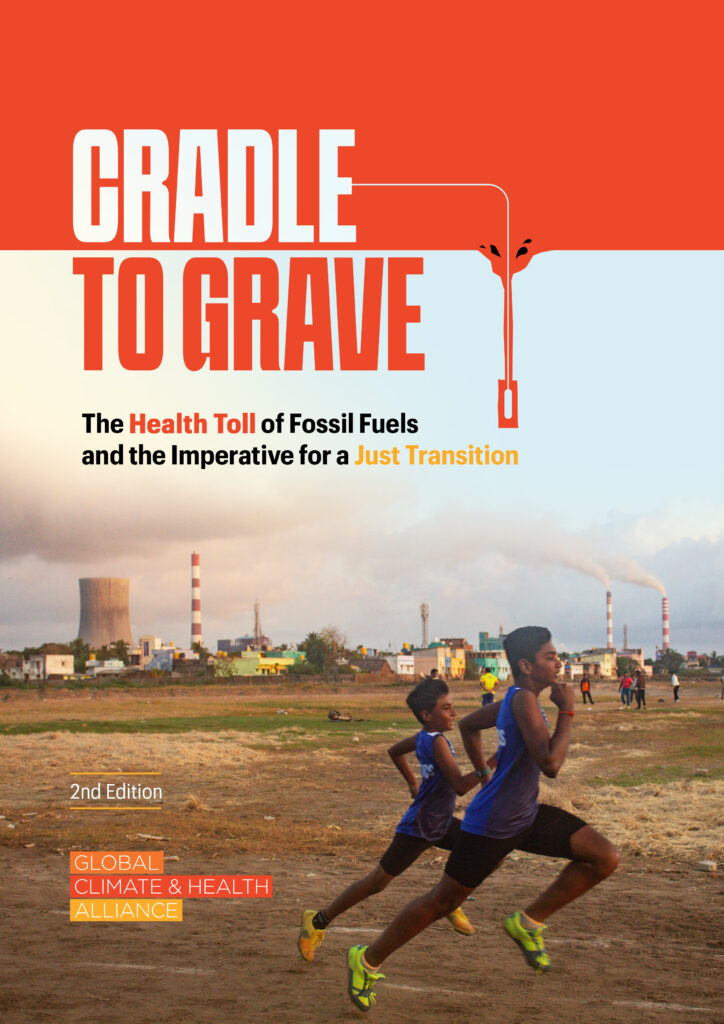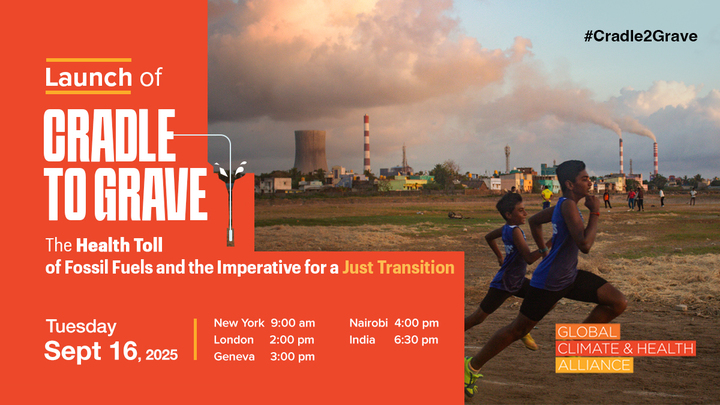Global, 16 September 2025:- A sweeping new report released today reveals the devastating impacts of fossil fuel extraction and use on human health. Cradle to Grave: The Health Toll of Fossil Fuels and the Imperative for a Just Transition provides the first comprehensive global overview of the health consequences associated with fossil fuel use at every stage of their lifecycle, from extraction to waste, and across the human lifespan, from pregnancy and pre-birth to old age.
Download: Cradle to Grave (EN pdf – plus French, Portuguese and Spanish)
Watch: September 9 press briefing on Youtube: English, French, Spanish or Portuguese
Download: Frequently Asked Questions (FAQ) on Cradle to Grave Report
Key Findings from the report:
- Fossil fuel-related pollution affects every stage of life, from fetal development to old age.
- Fossil fuels cause severe health harms at every stage of their lifecycle – extraction, refining, transport, storage, combustion, and disposal.
- Harm doesn’t end with initial exposure: the health impacts of fossil fuels are persistent and systemic.
- Fossil fuel health harms are unevenly and unjustly distributed in communities and across nations.
- Fossil fuels drive wider societal health impacts and exacerbate other pre-existing health disparities in communities and between nations.
- Climate policy and health policies have largely ignored these multidimensional health harms of fossil fuels.
- The cost of inaction is rising by the day, with global fossil fuel subsidies reaching an estimated US$7 trillion, including explicit subsidies such as tax breaks and price caps, and implicit subsidies, due to the unpriced health, environmental, and societal damages caused by fossil fuel production and use.
- A rapid and just transition away from fossil fuels–and to clean, affordable, renewable energy for all–is imperative for the health of everyone on earth.
“Fossil fuels are a direct assault on health, harming us at every stage of their lifecycle and every stage of our lives, from the womb to old age, driving miscarriages, childhood leukemia, asthma, cancer, strokes, and mental health crises”, said report author Shweta Narayan, Campaign Lead at the Global Climate and Health Alliance, a consortium of more than 200 health professional and health civil society organisations and networks from around the world addressing climate change.
“Fossil fuels’ toxic legacy persists for decades in our air, water, and bodies, exposing communities throughout the world, and imposing an especially heavy burden on marginalized communities”, Narayan continued. “Even if carbon emissions were captured tomorrow, fossil fuels would still poison, displace, and destabilize. Not only are they a climate problem, fossil fuels are driving a global public health emergency.”
Launch Event
The report will be officially launched on September 16 during an online event featuring the following speakers:
- Prof Elisa Morgera – UN Special Rapporteur on Climate Change
- Dr Courtney Howard – Chair, Global Climate and Health Alliance
- Nnimmo Bassey – Executive Director, Health of Mother Earth Foundation, Nigeria
- Dr Maria Neira – Former Director of the Public Health, Environment and Social Determinants of Health Department of the World Health Organization
- Bobby Peek – Director, groundWork South Africa
- A video message from Dr Jemilah Mahmood, Executive Director, Sunway Center for Planetary Health
- Moderator – Amy Westervelt, climate journalist,
In compiling the report, the Global Climate and Health Alliance (GCHA) collated existing scientific evidence, and gathered personal testimonials and case studies, to explore the multidimensional interactions between fossil fuels and human health and social wellbeing.
The report calls for “bold leadership from governments, civil society, businesses, and the global health community to swiftly transition away from fossil fuels… [and] by prioritizing public health, safety, health system stability, social justice, and environmental sustainability, this transition can not only mitigate harm but also create transformative change—protecting the most vulnerable and building a healthier, more equitable future [for all], for generations to come.”
“The age of fossil fuels has poisoned our air, broken health, and fractured dignity. We must choose a just transition without delay in order to safeguard life, restore justice, and secure a healthier future for all”, said Chrisitana Figueres, global climate leader, architect of the Paris Agreement and former UN climate chief.
“Fossil fuels are not just an environmental crisis—they are a public health emergency”, Dr Jemilah Mahmood, Executive Director of Sunway Centre for Planetary Health, Malaysia. “As health professionals, we know the cost of inaction is measured in lives. A just transition is both imperative and possible: a prescription for cleaner air, healthier communities, and intergenerational justice. The time for bold action is now.”
“Enough is enough – around the world, policymakers must put an end to the damage the outrageous and irresponsible ongoing pursuit of fossil fuel production is inflicting upon our health, said Dr Jeni Miller, Executive Director of the Global Climate and Health Alliance. “Cradle to Grave delivers a staggering overview of the sheer scale and range of health issues and impacts, including how our bodily functions are being impaired by the extraction and use of fossil fuels, and the global scale of the problem. No one is exempt from the toxic exposures caused by our addiction to fossil fuels. Political leaders already know the solutions for ending fossil fuel dependence and know that further delay is indefensible – all that is required is political courage.”
“At COP30, political leaders must respond with urgency by recognizing fossil fuel dependence as a widespread driver of disease and inequality, along with driving global warming emission”:, added Miller. “An appropriate response would see governments halting new oil, gas, and coal projects, setting clear timelines to phase out existing projects, and ending the shocking $1.3 trillion in direct subsidies that keep this industry afloat. Those resources should instead be invested in public health, clean energy, and protecting communities already living with the heaviest burdens of pollution and climate harm. Just as governments once curbed tobacco industry influence, they must now ban fossil fuel lobbying and disinformation. COP30 is the moment to act—not only for the climate, but for people’s health and futures.”
Frontline community members and health workers quotes:
“In Mozambique, gas has meant the loss of our land, our sea, and our safety. Farmers are displaced, fisherfolk cut off from the ocean, and communities torn apart by violence that has killed thousands and forced nearly a million from their homes. Children go hungry, families are traumatised, and our future health is being stolen” – Anabela Lemos, Director of Justiça Ambiental! Mozambique.
“We face oppression from the coal-fired power stations in our backyards that are meant to bring about development for our communities, but unfortunately, our lives have become a living sacrifice for so-called economic growth. We are struggling with contaminated water, and air pollution is hurting our health. We need action to address these issues through a Just Transition away from dirty fuel” – Sharon Mbonani – Mbalenhle Secunda Mpumalanga South Africa.
“In Korba, living near coal mines means living with disease. Children and elders struggle with asthma, bronchitis, and TB; families face birth defects, skin infections, and stomach illnesses from contaminated water. Asthma in children is alarmingly high. Coal doesn’t just generate electricityf—it generates suffering” – Neha Mahant, health worker, Korba, India.
Case studies included in the report:
- Health Impacts of Oil Extraction and Production in Nigeria
- Jharia Coal Seam Fires, India
- Cancer Alley, Louisiana, USA
- San Bruno Pipeline Explosion, California, USA
- Exxon Valdez Oil Spill, Prince William Sound,
- AlaskaSan Juanico Gas Explosions, Mexico Coal Slurry Spill in Borneo, Indonesia
- Extreme Weather: Hurricanes, Cyclones and Typhoons
- US Gulf Coast: Hurricanes x Oil Infrastructure
- India’s Eastern Coast: Cyclones x Refineries and Power Plants
- The Philippines: Typhoons x Oil Depots and Coal-fired Power Plants
- Extreme Heat
- US Gulf Coast
- Mediterranean
- In the Middle East
- A Healthy and Just Transition, and Clean Cooking
- Addressing Critical Energy Transition Minerals for a Just Global Transition
- The UN Secretary-General’s Panel on Critical Energy Transition Minerals
- Accelerating Global Action on Coal: The Powering Past Coal Alliance (PPCA)
- The impact of Canada’s New Anti-Greenwashing Law on Oil Majors and their
“Astroturf” groups
Download: Cradle to Grave (EN pdf – plus French, Portuguese and Spanish)
Watch: September 9 press briefing on Youtube: English, French, Spanish or Portuguese
Download: Frequently Asked Questions (FAQ) on Cradle to Grave Report
Contact:
Dave Walsh, Communications Advisor, Global Climate and Health Alliance, [email protected], +34 691 826 764 (Available from 0630 CET)
About GCHA
The Global Climate and Health Alliance is a consortium of more than 200 health professional and health civil society organisations and networks from around the world addressing climate change. We are united by a shared vision of an equitable, sustainable future, in which the health impacts of climate change are minimised, and the health co-benefits of climate change mitigation are maximised.
Find out more: https://climateandhealthalliance.org/who-we-are/about/



